CSotD: Everything Old is Old Again!
Skip to comments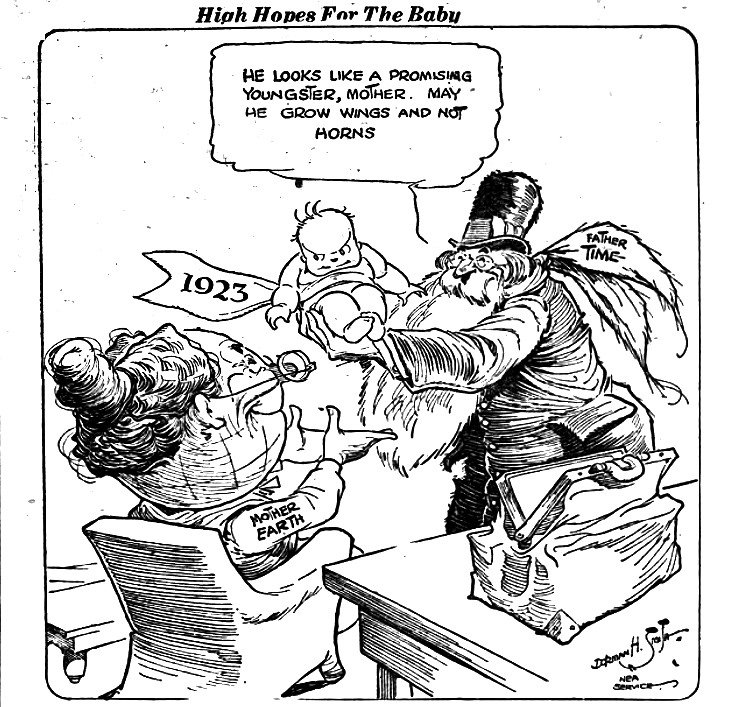
Dorman Smith offered this hopeful-but-dubious wish for the New Year a century ago, and there hasn’t been much changed since, except, I suppose, that most mothers today would be handed her baby in a hospital room rather than at home. Note that the genial smile on Father Time is hardly matched by the expression on the face of 1923.

And while we’ve got Mother Earth present, this summation by EA Bushnell provides a sense of where we stood in terms of progress, prosperity and air quality.
For years, New Years cartoons looked forward to “prosperity,” and we have to assume the word was prominent in political speeches of the time as well. But we should bear in mind, as the Roaring 20’s kicked off, that they were a lot more fun for people like Scott and Zelda than for the folks at the lower end of the spectrum, who greatly outnumbered the flappers and hipsters who are still saluted as typical of the era.
And who were about to get one helluva lesson in how the stock market really works.
Meanwhile, I’m not all that sure that Bushnell was off-base in equating prosperity with smoky skies. It would be nearly half a century before that linkage was disavowed.
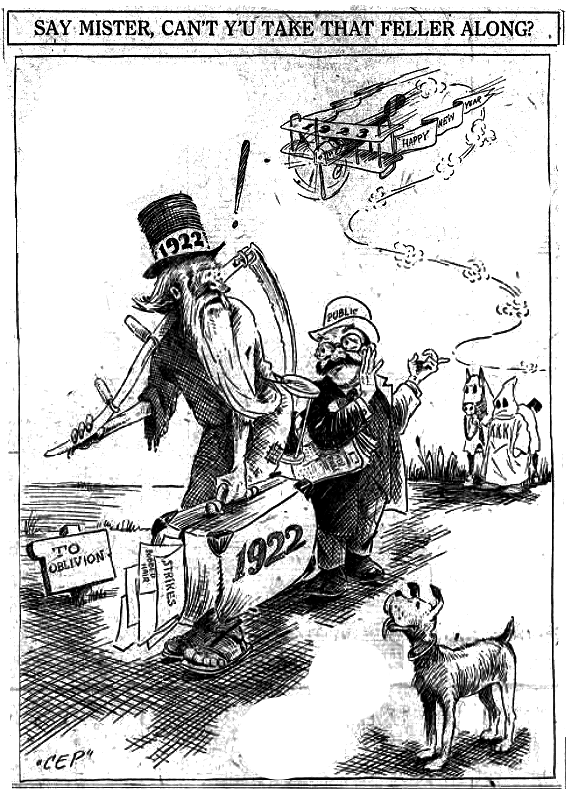
Speaking of pollution, W.A. Ceperley of the Quad City Times suggested that maybe the public was becoming fed up with the Ku Klux Klan, whose predations and corruption had been news fodder throughout the past year.
But however CEP and his editors felt about the Klan, they would continue to stick around a while longer.
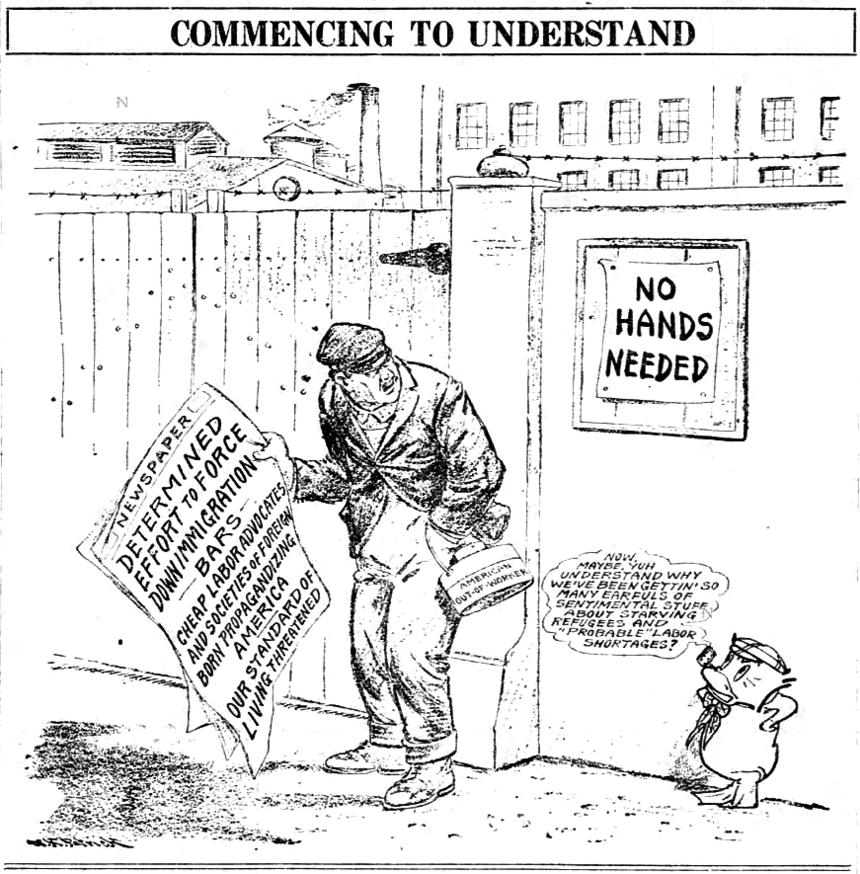
And this WK Patrick piece from the Fort Worth Telegram suggests that “Replacement Theory” was alive and well, at least in some circles, as Patrick’s signature duck blames refugees on the lack of jobs for real Americans.
Plus ca change, and you don’t need an active Klan to keep the drums beating and the fear of outsiders alive. Patrick didn’t speak of “prosperity” but he did remind readers that the mainstream media’s warnings about “our standard of living” being threatened was simply a cover for making war on the working man.
Though it might be argued that the mine owners took the notion of a war on working men a little too literally back there, particularly in the copper country.

The world was continuing to recover from the Great War, and Nelson Harding notes the difficulty 1923 would encounter in attempting to build a disarmed world of peace. It likely didn’t help that, while a significant group was promoting disarmament and international peace, another group was still hounding Germany for reparations.

And, Clifford Berryman pointed out, we were helping the Ottoman Empire come to a graceful conclusion that involved drawing new lines on other people’s maps in order to ensure that the Middle East would, from that moment on, be a land of peace and mutual amity.
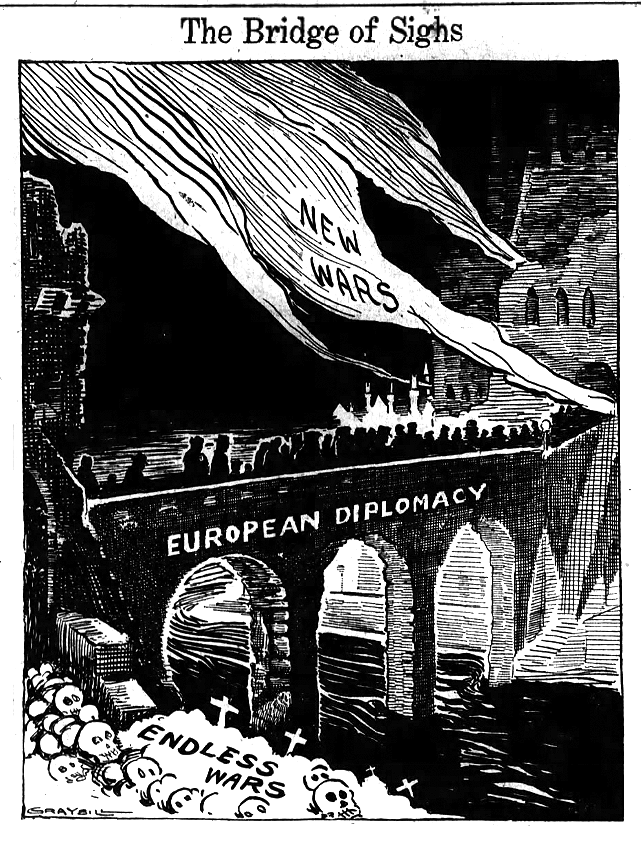
GE Graybill of the Omaha Bee took a somewhat pessimistic view of all this talk about peace and disarmament and suchlike, though note that he’s still putting it all over there as opposed to over here.
We heard about starving Armenians, we raised funds for the poor war-ravaged Belgians, but they were still out there somewhere, and it was easier to view them from afar in a world in which oceans really did separate people from one another.

Meanwhile, we had our own problems, and how you felt about Prohibition depended largely on which newspaper you read. In “wet” papers, it was treated largely as a joke, while “dry” papers had more dire commentary like this Morris cartoon. Prohibition was two years old, but it would be another decade before it ended, and, in the meantime, Americans quarreled over the concept.

It’s a little hard to tell how Dorman Smith felt about Will Hays imposing some rules and regulations on the film industry, and clothing him in diplomacy, tolerance and charity is either fulsome praise — in the classical sense of the adjective — or outright sarcasm.
What is clearly unclear are the examples Smith offers, since romantic star Wally Reid had just collapsed from his morphine addiction but wouldn’t die until March, and Fatty Arbuckle has been charged with rape but would not be acquitted until February.
Hays had been Warren Harding’s campaign manager and had a finger in the Tea Pot Dome pie, though that wouldn’t be apparent when this cartoon ran.

Ding Darling took a decidedly kind view of the year just past, as the new driver salutes the old guy.
I’m not sure I’d offer the same praise to whatever and whoever was at the wheel in 2022. It reminds me a little more of the kid who went to the church picnic and got stung by a bee, fell on a rock, etc etc and told his mother, “I’m so glad I’m home I’m glad I went.”

John McCutcheon speaks more for me, a century later, because, while there are several things that seem to be looking up and even worth looking forward to in the year to come, I think this one ended about when it needed to, and I’m not sure we’d have survived had this been a leap year.
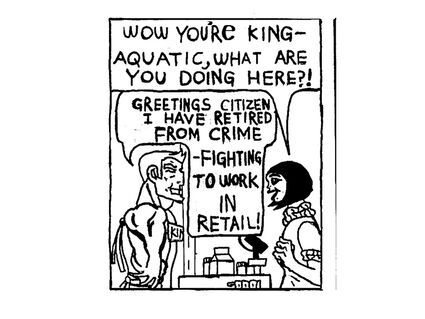
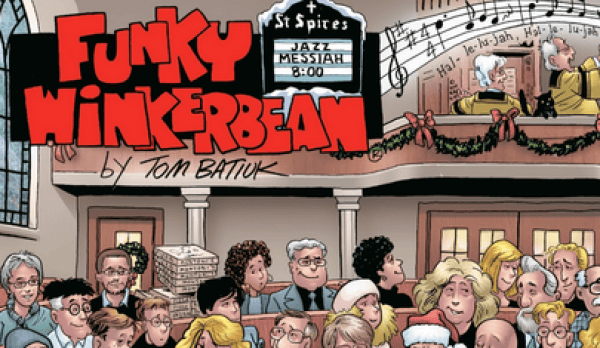
Comments 1
Comments are closed.